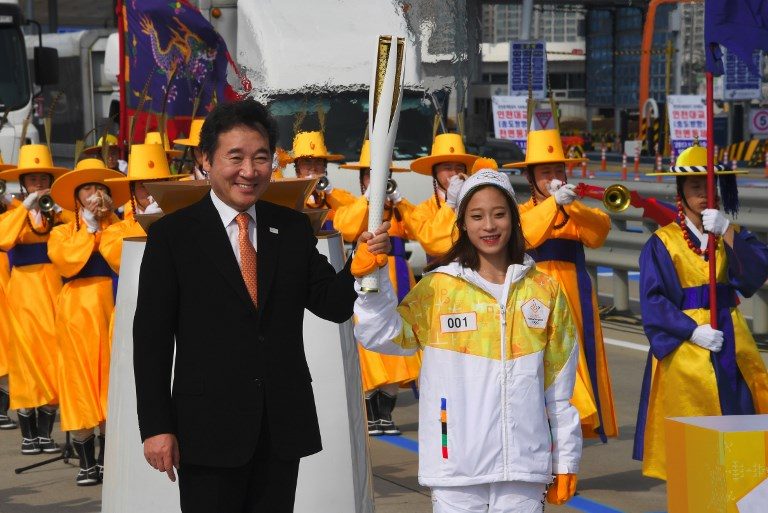SUMMARY
This is AI generated summarization, which may have errors. For context, always refer to the full article.

INCHEON, South Korea – The Olympic flame arrived in South Korea on Wednesday, November 1, 100 days ahead of the opening ceremony for the 2018 Pyeongchang Winter Games.
South Korean Olympic gold-winning figure skater Kim Yu-Na and the country’s sports minister carried the flame, in a white security lamp, down the steps at Incheon airport after a flight from Greece.
It had been kindled from the sun’s rays in a ceremony at the ancient Temple of Hera in Olympia.
“Today is a very important and proud symbol of our work and passion in bringing one of the most exciting sporting events ever to our country,” said chief organizer Lee Hee-Beom.
“We want the Olympic torch relay to connect you to the Games, and ignite passion and excitement in every corner of Korea,” Lee added.
The 2,018-kilometer torch relay was led off by 13-year-old figure skater You Young – although she is too young to compete in the Games – who jogged past hundreds of cameras wearing a “1” tag on her chest.
A total of 7,500 torchbearers will carry the flame, organizers said, symbolizing the 75 million people who live on both sides of the divided Korean peninsula.
Slow ticket sales
The Games will be held from February 9 to 25, but have been marred by slow ticket sales and the looming menace of nuclear-armed North Korea, just 80 kilometers away from Pyeongchang across the Demilitarized Zone.
Over the two weeks of the Games, 1.18 million tickets are available, with 180,000 sold internationally so far.
But South Korea is far from the traditional winter sports markets of Europe and North America, making domestic sales crucial, and South Koreans have bought little more than 160,000.
Sales are strong for blue-riband events, such as the ice hockey finals, and sports traditionally popular in the host country, such as short track speed skating and figure skating.
But for less popular disciplines such as luge and cross country skiing, ticket take-up has been weak, raising the embarrassing prospect of images of empty seats being beamed around the world.
Organisers told Agence France-Presse that banks, regional authorities and the education ministry had agreed to buy hundreds of thousands of tickets to fill up the Games venues if domestic sales continue to disappoint.
The nuclear and missile threat from North Korea is also putting a dampener on the Games.
Pyongyang carried out its sixth nuclear test in September – by far its most powerful yet – and has lobbed missiles over Japan into the Pacific, while trading insults and threats of war with Washington.
Military tensions
France, Germany and Austria have raised concerns over the safety of their athletes during the Games, and Britain has drawn up evacuation plans in case of an emergency.
But in an interview with Agence France-Presse, Lee dismissed fears of an attack as “a kind of exaggeration” and offered reassurances that the South has held several “very safe and secure sports events”.
“Pyeongchang is not the exception,” he said, adding that sports and politics are separate issues.
There have been decades of military tensions on the peninsula, during which South Korea has hosted major events such as the 2002 FIFA World Cup.
The 1988 Seoul summer Olympics took place only months after a bomb planted by North Korean agents killed all 115 people on board a South Korean plane, in what may have been an attempt to scare off foreign spectators and contestants.
Organizers have repeatedly urged North Korea – which boycotted the 1988 Summer Games in Seoul – to send its athletes to take part, and say their presence would add to the safety and security of the event.
So far, only two North Korean figure skaters have qualified to participate, and while others could do so in cross-country skiing and short-track speed skating, their prospects are believed to be poor.
Lee said the International Olympic Committee (IOC) will consult international sporting federations over wild cards to enable more North Koreans to take part.
North Korea did take part in the 2014 Asian Games in Incheon, sending a high-profile delegation on the final day to congratulate its athletes. – Rappler.com
Add a comment
How does this make you feel?





There are no comments yet. Add your comment to start the conversation.